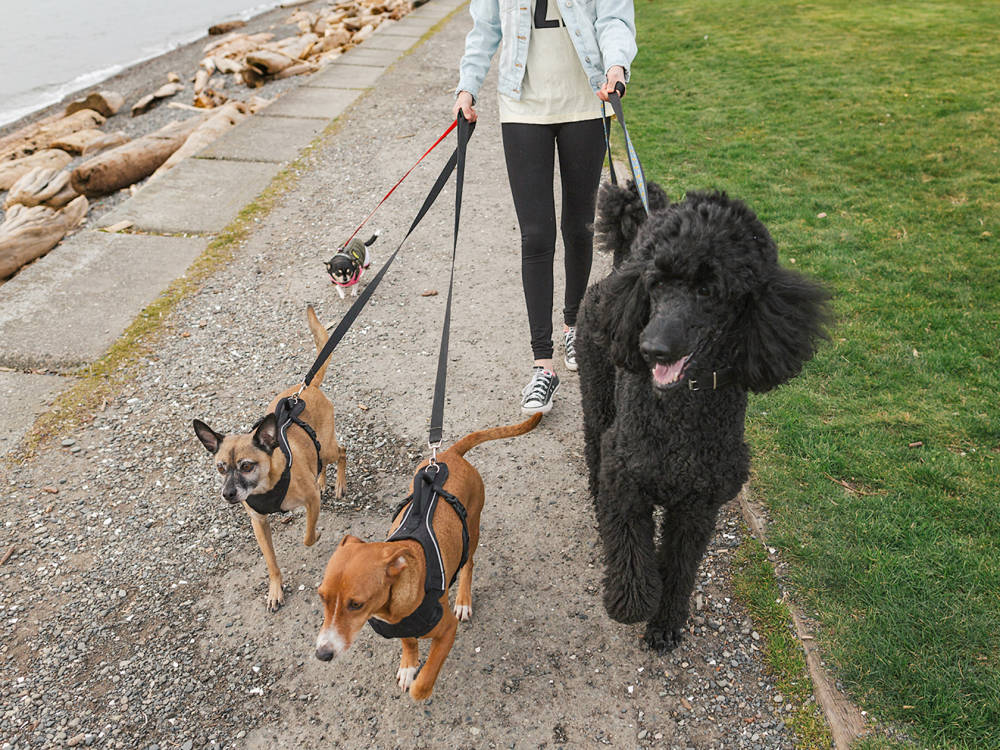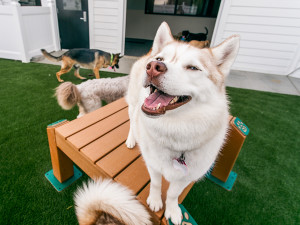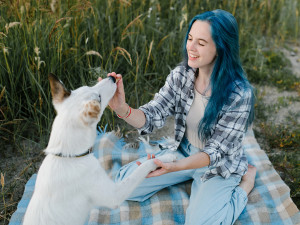The Race to Find a Back-to-Work Dog Walker
Who will love your dog like their own (for 30 minutes per day).

Share Article
Let’s start with the obvious: dogs love walks. And why wouldn’t they? Walks give them the chance to do a lot of their favorite things: explore, sniff, pee on things that aren’t theirs. Dog-less friends are always lamenting their lack of motivation to “get outside more” while — lucky you! — you can escape the afternoon slump with a nice dog walk around the block. Until you can’t. Sadly, even the most flexible of schedules can’t always accommodate the outing your pup deserves. That’s where dog walkers come in. But not all dog walkers are professionals: For some, it’s a side hustle until they ink a book deal and they can be careless with your pup’s safety (or raid your fridge while you’re at work). So how do you pick someone you can trust? Keep reading — we’ve got you.
Consider your dog’s personality
You want to find a walker who’s not only good with dogs but good with your dog, right? To zero in on a good match, think about your dog’s personality and look for someone who has experience with similar dogs. “Let’s say your dog is leash-reactive. Ideally, you want to find someone who has experience walking dogs that get a little crazy on-leash, so you have confidence in their ability to manage the situation successfully,” says Dr. Elizabeth Shines, DVM. It will also help ensure that the dog walker can continue with any training you already do with your dog to work through reactivity issues. Dogs need consistency. Without it, they get confused, and their behavior can regress.”

littleKin™ is Kinship’s home just for puppy and kitten parents. Bop over to check out expert advice, new pet tools, and special deals—all curated for your newest family member.
opens in a new tabKate Jaffe, Rover’s Trends Expert, also suggests looking for someone who will tailor the walk to your dog’s needs. “If your dog is athletic, see if you can find someone who can take your dog for a run or hike. Or, if your dog is uncomfortable around other dogs, look for someone who can walk them one-on-one instead of in a group.”
Do your research
It’s important to make sure whoever you work with is the real deal. As a starting point, make sure anyone you’re considering is backed by insurance — either an individual policy or coverage through a dog walking service. If you’re going through a service, find out how they how they screen their walkers and if they do background checks. If you’re talking to an individual, ask them to provide references or a fingerprint clearance card.
Once you’ve found a few options you feel good about, read their reviews. “You know your dog better than anyone,” says Jaffe. “Think about the qualities you know will be a good match for your dog and look for positive reviews that validate those qualities. When you find someone who sounds promising, schedule an in-person meet-and-greet. That goes a long way toward making sure you’ve made a great choice for you and your dog.”
Ask the right questions
When doing a face-to-face interview, remember that you’re looking for someone you can rely on and who will give your dog the same experience that you would. Kaitie Edel, CX Communications Manager for Wag!, recommends starting with a high-level question. “Ask them what their philosophy is on the dog-human relationship. Make sure this person will work with your dog using positive reinforcement rather than punishing your dog for unwanted behavior.” Chances are, you won’t be around when the dog walker comes to take your dog. Don’t be afraid to ask for things that will let you know that your pup is getting the kind of care they deserve (and that you paid for).
“Ask if the dog walker can send you updates or photos,” adds Jaffe. “That will accomplish two things: You’ll know the walk that you booked happened as planned, and you’ll be able to see for yourself that your dog is having a good time. Updates like that are a great way to make you feel more comfortable and keep you connected to your dog while you’re away.” While getting your questions answered is important, you shouldn’t be the one driving the whole conversation. “The dog walker should be proactively asking questions about your dog — about their routine, their triggers, their favorite things,” says Edel. “They should be engaged and interested in learning everything there is to know about your pup.”
Keep an eye on your pup’s behavior
Once you’ve found a dog walker you and your dog love, the hard part is over. Still, you’ll want to keep an eye out for red flags. Look for any differences in your dog’s behavior over time,” says Dr. Shines. “If you notice that their behavior has changed or their training seems to have regressed, talk to the dog walker. It doesn’t necessarily mean they’re to blame, but it may mean you need to recalibrate to make sure everyone is on the same page with the care of your dog.” Another pro-tip: fit your dog with a Whistle GPS trackeropens in a new tab so you can keep tabs on when and where your dog goes on their walks without you.
There’s no one like you — to your dog — so you owe it to them to find the next best person so they’re in good hands.

Kate Sheofsky
Kate Sheofsky hails from San Francisco, where she developed a love of writing, Giants baseball, and houses she can’t afford. She currently lives in Portland, OR, and works as a freelance writer and content strategist. When not typing away on her laptop, she enjoys tooling around the city with her two rescue pups searching for tasty food and sunny patios.

